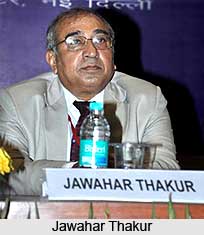 Controller General of Accounts is the principal accounts adviser to the Government of India and is responsible for establishing and maintaining a technically sound management accounting system. The organization of Controller General of Accounts was set up in the Ministry of Finance, Department of Expenditure in October 1975 to administer matters pertaining to departmentalisation of accounts of the Union. The Comptroller General of Accounts is the apex accounting authority of the Central government and exercises the powers of the Indian President under Article 150 for prescribing the form of accounts of the Union and State governments of India. According to Article 150 of the Constitution of India the accounts of the Union and the States shall be kept in such form as the President may, on the advice of Comptroller and Auditor General of India, prescribe. This function of the President has been allocated to Controller General of Accounts in terms of Article 77 (3) of Constitution of India.
Controller General of Accounts is the principal accounts adviser to the Government of India and is responsible for establishing and maintaining a technically sound management accounting system. The organization of Controller General of Accounts was set up in the Ministry of Finance, Department of Expenditure in October 1975 to administer matters pertaining to departmentalisation of accounts of the Union. The Comptroller General of Accounts is the apex accounting authority of the Central government and exercises the powers of the Indian President under Article 150 for prescribing the form of accounts of the Union and State governments of India. According to Article 150 of the Constitution of India the accounts of the Union and the States shall be kept in such form as the President may, on the advice of Comptroller and Auditor General of India, prescribe. This function of the President has been allocated to Controller General of Accounts in terms of Article 77 (3) of Constitution of India.
Functions of Controller General of Accounts
The functions of the Controller General of Accounts include the framing of rules and regulations in the field of accounts and internal audit, the publication of account codes and manuals as well as issue of periodical instructions and circulars. He prepares a critical analysis of expenditures, revenues, borrowings and the deficit for the Finance Minister every month. He also prepares annual Appropriation Accounts and Union Finance Accounts for presentation to the Indian Parliament. The office of the Controller General of Accounts is responsible for consolidation of accounts of the Union government. These after auditing by the C&AG are placed on the table of both the houses of Parliament along with the report from the latter. It also looks after pensions of the Central government employees. The Central Pension Accounting Office commenced functioning with effect from 1st January, 1990.
The Controller General of Accounts is responsible for prescribing the form of accounts relating to the Union and State governments; laying down of accounting procedures; framing and revising rules of accounting by Central (Civil) Accounts Officers, India and the administration of rules under Article 283 of the Constitution.
Thus discussed is the role and functions of the Controller General of Accounts, the prime accounting authority of the Central Government.




















